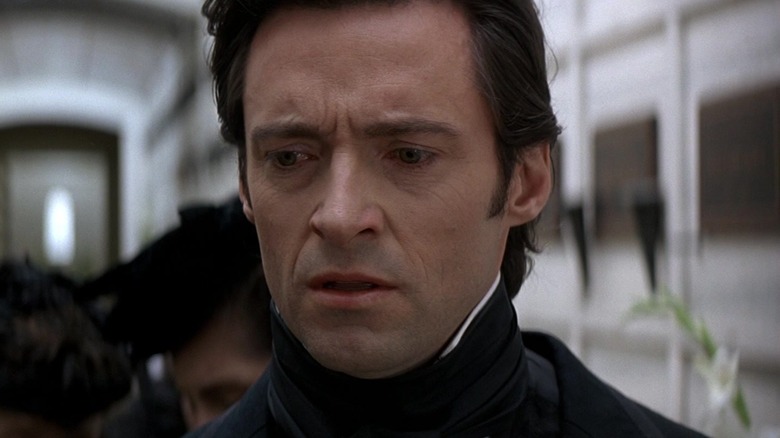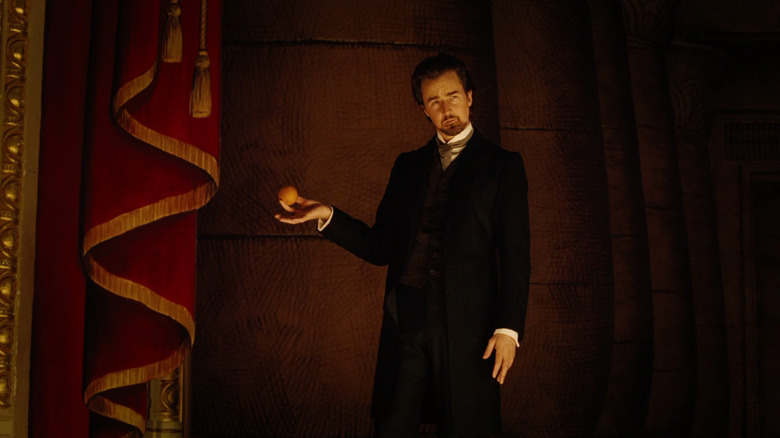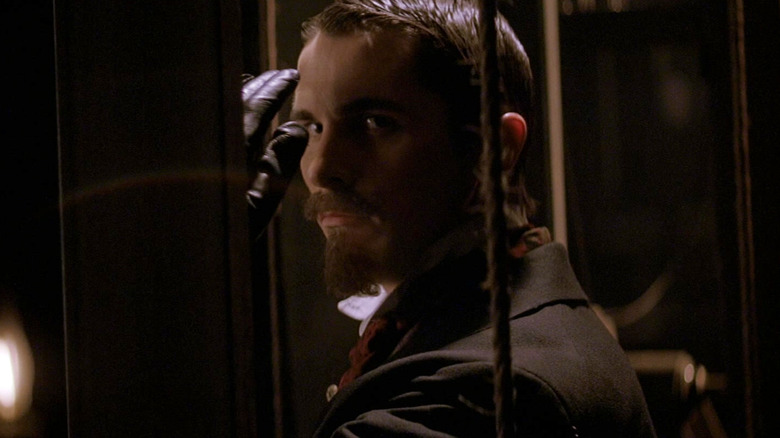Before He Conquered The Box Office, Christopher Nolan Won This Dueling Movies Battle
The Christopher Nolan of 2006 was not the Christopher Nolan of today. Though he had cut his teeth as a tentpole director on "Batman Begins" a year earlier, Nolan hadn't gone into that movie with the intent of launching a trilogy. Nor, for that matter, had he shown any inkling of becoming a big-budget tradesman exclusively. Even on "Batman Begins," Nolan hadn't entirely brushed off the mindset of an artist painting on a smaller canvas and used basic camera setups for much of the action (which, sorry to say, is why most of the film's fights devolve into a chaotic flurry of fisticuffs).
This didn't radically change with his follow-up, "The Prestige," but the movie was still a crucial stepping stone to his love affair with IMAX and the more dynamic filming style he embraced in the years that followed. The 2006 period piece tells a small-scale tale of two rival magicians in a way that makes it feel like an epic, in no small part thanks to director of photography Wally Pfister. Nolan's go-to DP for the first decade of his directorial career conjures some dark, mesmerizing visuals here, not the least of which is the haunting final shot. It's an image that serves as a horrifying capstone to the film's exploration of obsession and its all-consuming nature, a theme that Nolan has returned to again and again in his oeuvre.
More than that, "The Prestige" marked the point where Nolan's artistic fixations and narrative tendencies began to fully crystallize; that includes his fascination with the ways time, space, and memory shape our perspective, as well as the motif of parents enduring hell to be reunited with their children. Perhaps that's why, nowadays, it's easy to forget Nolan's movie was only the slightly more popular film about 19th-century magicians with a huge plot twist to come out of that year.
The Illusionist and The Prestige opened mere months apart
Sometimes, the phenomenon of dueling movies — where two films with remarkably similar premises release in close proximity to one another — is the result of deliberate malice, as was the case when DreamWorks' "Antz" and Pixar's "A Bug's Life" dropped a mere 49 days apart. Other times, though, there's apparently something in the water, as seems to have been the case when Nolan's "The Prestige" debuted just 63 days after Neil Burger's "The Illusionist" arrived to close out the 2006 summer box office derby.
"The Prestige," most notably, had already been put into motion years earlier, with Nolan having become formally attached to helm Christian Bale and Hugh Jackman's sleight-of-hand grudge match in April 2003 (per Variety). The two films are also dramatically different once you get past the surface-level resemblance. "The Illusionist," in particular, tells a swooning, romantic tale of a renowned Austrian magician (Edward Norton) who vies to rescue his childhood love (Jessica Biel) from the malicious Crown Prince (Rufus Sewell) to whom she is unwillingly engaged. That the pair are only in this situation because of their different social standings makes this a classic story of yearning lovers kept apart by society itself.
Class tensions fuel the story in "The Prestige" as well. Where Bale's illusionist comes from a working-class background and, thus, prioritizes his skills above all else, Jackman's magician was born into wealth and privilege (a fact he shrewdly keeps on the down-low) and, as such, has a keen understanding of and appreciation for the value of showmanship. But where "The Illusionist" is ultimately a melodrama that creates a glossy, amber-tinted snapshot of Vienna in the late 1800s, "The Prestige" is a story about a vengeance-fueled feud as chilly and gritty as the film's vision of London at the turn of the 20th century.
Perhaps that's why filmgoers didn't flock to "The Prestige" quite the way one would've expected on the heels of Nolan's commercial breakthrough success with "Batman Begins."
Why The Prestige is better remembered than The Illusionist
In the end, Nolan eked out a victory in the clash of the magic-movies, but only just so. "The Prestige" made more money at the box office than "The Illusionist" ($109.7 million versus $87.9 million), yet the latter was probably more profitable thanks to its slender $16.5 million budget, as opposed to the (still modest) $40 million price tag for Nolan's picture. Their Rotten Tomatoes scores are also precariously close, with "The Prestige" landing a 77 percent critics score against 73 percent for "The Illusionist." However, in a turn of events Nolan himself would appreciate, the passage of time suggests "The Prestige" has lingered in our collective memories far longer.
But maybe that was to be expected. Even at the time of its release, "The Illusionist" felt a little thin. Despite drawing inspiration from The Mayerling Incident (a real-life scandal that involved Rudolf, Crown Prince of Austria), Burger's film lacks depth as a political allegory. Its big twist is also telegraphed to the degree that it becomes kind of impossible not to guess in advance, while Norton and Biel frankly don't have the chemistry to sell their star-crossed romance. (Paul Giamatti, and his sexy beard, as a conflicted chief inspector who gets entangled in this whole sordid affair is innocent, of course.)
"The Prestige," on the other hand, has layers of meaning that will get your noodle baking long after it's over. It's also the closest Nolan came to making a horror movie in his early years and offers plenty to chew on beyond its own huge secret. (One that, yes, can be guessed ahead of time, but that's no-so-subtly the point.) And as much as Nolan's picture sometimes plays fast and loose when it comes to adapting Christopher Priest's novel of the same name, it simply has more to work with than "The Illusionist" (which struggles to stretch its own source material, Steven Millhauser's short story "Eisenheim the Illusionist," far enough to sustain an entire feature).
Still, I don't want to beat up "The Illusionist" too much. It is, after all, a well-crafted, ambitious, low-to-mid-budget mainstream theatrical film made for adults. Can you imagine getting two of those in just as many months in 2025? Now that's what I would call a magic trick.


